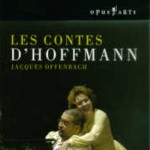Set in mostly empty spaces, with green walls and a green piano upon which the name “Stella” is scrawled an infinite number of times, this Hoffmann, recorded in Bilbao in May, 2006, is a feast for neither eye nor ear. Director Giancarlo del Monaco’s vision of the piece is that Hoffmann actually is the dwarf Kleinzach, complete with a hump on his back. He is no idealistic poet, but a man who has lost everything; a pitiful whiner who is laughed at wherever he goes. Tenor Acquiles Machado, a small, roundish man, embodies such a poor creature well, but you wonder if del Monaco would have opted for such an interpretation if he had had as his Hoffmann Placido Domingo, Alfredo Kraus, or Rolando Villazon. Del Monaco asks his tenor to sing while kneeling, wearing a mask and at stage rear almost enough to make the audience think he wished he didn’t need a Hoffmann. Under such circumstances, Machado, though with some strain at the top of his voice, does a fine job. His tone is mostly ringing and he offers as nuanced a performance as he can, certainly allowing us to understand how pathetic the character is.
Michael Scott’s sets and costumes, as mentioned, are minimal. The walls open and close to allow for movement and light, there are plain chairs that get re-arranged, there is no noticeable tavern, Spalanzani’s laboratory doesn’t look like one (and half of his guests are in wheelchairs), Venice is implied by a blue floor that looks like water and some shimmering fabric, and the Antonia act, which is bright red, is a large room with chairs and a piano.
Giulietta does not move; swathed in gold, she seems only to exist from the waist up. The rest of her is acres of material, sort of like a lamp table with a floor-length throw. Schlemil also is stationary–he seems glued to his chair. A car breaks through the wall near the end of the Olympia act, a covered gondola does the same in Venice, and a huge violin bursts into Antonia’s house. When Antonia’s Mother appears (she walks into the room–no portrait here) all of the characters from the other acts enter as if in a Zombie movie, and lurch about. The lighting, by Wolfgang Von Zoubek, is splendid if weird and relatively senseless throughout: why would Venice turn alternately, red, white, and blue during the three-minute Septet? But you get the picture: there’s a great deal of affect here, and while it eventually adds up to a sad story of a sad man who lives in a dreadful kaleidoscope, I’m not certain it tells us the same story Offenbach had in mind.
In addition to Machado’s good performance, there is some fine work here. Maria Bayo’s bedraggled-looking Antonia is a warm-hearted, passionate portrayal, phrased and acted beautifully, although the very top of her voice seems to have shortened with the years–her D-flat is now a C. Milagros Poblador’s Olympia is coloratura pure, up to interpolated high G-flats, but the sound is somewhat raw. She convinces with her doll-like movements. What little the non-moving Valentina Kutzarova has to do in the Giulietta act is splendid; hers is a fine, burnished mezzo. Katherine Goeldner’s Muse/Niclausse is simply superb in all ways–she’s a mezzo to watch. Konstantin Gorny’s portrayals of the four villains are well if dryly sung, but he makes no attempt to distinguish among them: Is this a del Monaco idea? The smaller roles are all well taken.
Under Alain Guingal’s leadership the excellent Bilbao Orchestra plays with little subtlety, invariably at one volume (loud) but with great excitement. The chorus falls out of sync with the orchestra frequently (the opening “Glug, glug, glug” seems about to fall apart).
This entire production appears to have been thoroughly thought-through, but it has precious little effect for some reason. Perhaps the notion of an anti-hero has been taken a bit too literally; perhaps the design–so place and time unspecific and so lacking in humanity–succeeds too well. At any rate, with the 1981 Covent Garden version still available (Domingo at his best; director John Schlesinger’s depressing point of view sensible and interesting), this set isn’t completely necessary. Some may appreciate del Monaco’s production more than I, but it still won’t compare with the Covent Garden (despite its poor subtitles, by the way).
Opus Arte’s picture and presentation are superb, with subtitles in all major European languages. Extras include interviews with Bayo, Machado, and the president of the Bilbao Opera Society, none of which will sway you in any direction at all.
































